I remember the first time I picked up a titanium drill bit. It felt fancy. Gold-tinted, sharp, and promising. But was it really worth the extra money? That question kept bugging me. So, I tested, researched, and drilled my way into the truth.
If you’re wondering is titanium good for drill bits, let me walk you through what I’ve learned from hands-on use, loads of trial and error, and yes, a few broken bits along the way.
Article Summary
- What Are Titanium Drill Bits, Really?
- Why I Tried Titanium Drill Bits in the First Place
- When Titanium Drill Bits Shine Bright
- But Are They Worth the Price?
- When Titanium Isn’t the Right Choice
- How Long Do Titanium Drill Bits Last?
- Titanium vs Cobalt vs Black Oxide Drill Bits
- Real Talk: My Favorite Brands
- Common Mistakes to Avoid
- Are Titanium Drill Bits Good for Metal?
- Are Titanium Drill Bits Good for Steel?
- FAQ On Is Titanium Good for Drill Bits
- My Final Verdict: Are Titanium Drill Bits Good?
What Are Titanium Drill Bits, Really?
Titanium drill bits are basically high-speed steel (HSS) bits with a titanium coating. It’s that coating that gives them their shiny gold look. But more than looks, it gives them strength.
There are three common types:
- Titanium Nitride (TiN): Most common. Increases hardness and wear resistance.
- Titanium Carbonitride (TiCN): Better than TiN, especially for tougher metals.
- Titanium Aluminum Nitride (TiAlN): Best for high-heat applications.
These coatings help reduce friction, keep the bit cooler, and make it last longer compared to plain steel bits.

Why I Tried Titanium Drill Bits in the First Place
I was drilling through a steel bracket one day using a cheap black oxide bit. It kept slipping and heating up. So I switched to a titanium bit, and wow—it cut cleaner and faster.
Here’s what stood out to me:
- Faster drilling
- Cleaner holes
- Less heat
- Less chance of snapping
It felt like I had upgraded from a budget tool to a pro-level one without changing my drill.
When Titanium Drill Bits Shine Bright
Titanium drill bits are especially good for:
- Metal: Aluminum, copper, mild steel
- Wood: Clean, splinter-free holes
- Plastic: Less melting from heat
They excel when you need precision and don’t want to burn through bits fast.
Ideal Use Cases:
| Material | Performance with Titanium Bits |
|---|---|
| Wood | Excellent |
| Soft Metals | Excellent |
| Plastic | Very Good |
| Hardened Steel | Poor (use cobalt instead) |
But Are They Worth the Price?
Here’s the deal—titanium drill bits cost more than basic bits. But if you’re drilling often, especially into metal, they save you time and frustration.
Let me break it down:
- Basic HSS Bit Set: $10–$15
- Titanium-Coated Set: $20–$30
- Cobalt Bit Set: $30–$50+
What You Get for the Money:
- Longer life
- Better heat resistance
- Cleaner cuts
So yes, I’d say they’re worth it—if you use them right.
When Titanium Isn’t the Right Choice
I made this mistake once: I tried using a titanium bit on a hardened steel bolt. Bad idea. It dulled fast.
Avoid Titanium Bits For:
- Hardened steel
- Cast iron
- Abrasive materials like tile or stone
For those, go with cobalt or carbide.
How Long Do Titanium Drill Bits Last?
With regular use and proper care, I’ve had titanium bits last me years. The catch? You can’t really sharpen them easily because the coating wears off.
Tips to Make Them Last:
- Use cutting oil for metal
- Don’t force the bit
- Use the right speed
- Let it cool between uses
Treat them right, and they’ll treat you right.
Titanium vs Cobalt vs Black Oxide Drill Bits
Here’s a quick side-by-side I put together from my garage experience:
| Feature | Titanium | Cobalt | Black Oxide |
|---|---|---|---|
| Material | HSS + Coating | Solid Alloy | HSS + Coating |
| Durability | High | Very High | Moderate |
| Best For | Wood/Metal | Hard Metals | Wood/Plastic |
| Can Be Sharpened? | Not easily | Yes | Yes |
| Heat Resistance | Good | Excellent | Fair |
| Price Range | $$ | $$$ | $ |
Real Talk: My Favorite Brands
Not all titanium bits are created equal. Some wear out fast, even if they look good. I’ve had great luck with:
- DEWALT Titanium Pilot Point Set
- Bosch Titanium Drill Bit Set
- Irwin Tools Titanium Nitride Coated Bits
These brands don’t just market well—they perform.
Common Mistakes to Avoid
I’ve been there. Don’t do these:
- Using them on hard metals: Kills the coating.
- Running the drill too fast: Friction kills bits.
- Skipping pilot holes: Can cause wandering and breakage.

Are Titanium Drill Bits Good for Metal?
So, I had this small project where I needed to hang a metal rack in my garage. I pulled out a titanium drill bit from my kit because, let’s be real, the golden color just looks tough. But here’s the thing—looks aren’t everything. I wanted to know: is titanium good for drill bits when it comes to metal?
My Honest Take After Using Them
I drilled into aluminum first. No issues there. The bit slid in like butter. It stayed cool, didn’t wobble, and left a clean hole. I felt like a pro.
Then I tried mild steel. It worked… at first. But after a few holes, the bit started to slow down. The edges didn’t feel as sharp. I realized that the titanium coating was doing its job, but it doesn’t last forever. Once the coating wears off, you’re just left with a basic high-speed steel (HSS) bit.
What Titanium Bits Do Well with Metal:
- Great for soft metals like aluminum, brass, and copper
- Ideal for quick, shallow holes
- Work well when you don’t drill often
Where They Fall Short:
- Not the best for thick or hard metals
- The coating wears off after repeated use
- You can’t really sharpen them without losing that coating
Tip I Wish I Knew Earlier
If you’re like me and you drill into metal just once in a while, titanium bits are fine. But if you’re planning to work with steel all day, you’ll want something tougher—like cobalt drill bits. They last longer, and you can resharpen them.
Are Titanium Drill Bits Good for Steel?
Now, let’s talk steel. One day, I had to bolt a steel plate to a workbench. I figured, hey, I’ll grab that same titanium drill bit I used last time. Big mistake.
What Happened?
At first, the bit started cutting fine. But about halfway through, I noticed the smoke. Not a good sign. The bit got hot—really hot. I backed off and touched the tip (don’t do this—ouch!). It was dull. Totally cooked.
So I learned the hard way: titanium drill bits are not great for hard steel.
Here’s Why Steel Is a Tougher Beast:
Steel is dense. It heats up the drill bit fast. Titanium bits can’t handle that heat for long. The titanium nitride coating (that gold stuff) wears off. Once it’s gone, the bit is just high-speed steel—nothing special.
What They Can Handle:
- Thin steel sheets (like under 1/8”)
- Jobs where you don’t care if the bit dulls after a few holes
- One-off DIY tasks where cost matters more than longevity
What They Struggle With:
- Stainless steel
- Thick angle iron or structural steel
- Jobs that need repeated drilling in hard metals
So, Is Titanium Good for Drill Bits If You’re Drilling Steel?
I’d say no—not for serious work. It’s fine in a pinch. But if you want clean holes in steel that don’t chew up your bits, go for cobalt or carbide.
Here’s a quick comparison I made after testing a few bits:
| Drill Bit Type | Good for Steel? | Can Be Sharpened? | Coating Lasts Long? | Cost |
|---|---|---|---|---|
| Titanium-Coated | ❌ Sometimes | ❌ No | ❌ No | 💰 Cheap |
| Cobalt Alloy | ✅ Yes | ✅ Yes | ✅ Yes | 💰💰 Medium |
| Carbide-Tipped | ✅✅ Excellent | ❌ No | ✅ Very long | 💰💰💰 Expensive |
So, when someone asks me, “is titanium good for drill bits?”—I say, “Yes, for light stuff.” It’s great for wood, plastic, and soft metal. But if you’re working with steel, you’ll want something stronger.
Trust me—I learned it the hot, smoky way.
FAQ On Is Titanium Good for Drill Bits
Are titanium drill bits good for metal?
Yes—as long as it’s soft metal like aluminum or mild steel.
Can titanium bits be sharpened?
Technically, yes. But sharpening removes the coating, so it’s not ideal.
Do titanium drill bits rust?
The coating helps resist rust, but store them dry just to be safe.
What’s better: titanium or cobalt drill bits?
Titanium for general use; cobalt for tough metals.
My Final Verdict: Are Titanium Drill Bits Good?
Yes—if you use them for the right jobs.
Titanium drill bits are a solid middle ground between basic HSS bits and high-end cobalt ones. They’re fast, durable, and great for wood, plastic, and soft metals. Just don’t expect them to survive hardened steel.
So next time someone asks, “Is titanium good for drill bits?” you’ll know the answer. It’s a yes from me—with a few warnings.
Know More:
- How Much Does It Cost To Drill A Bowling Ball?
- What Size Drill Bit for 10 Screw
- Are You Supposed To Submerge Powered Orthopedic Drills For Decontamination?
- A 135 Split Point Cobalt Letter Drill Bits?
- How Long Does It Take to Drill a Water Well?
- What Type of Drill Bits Won’t Snap?
- What Are the Best Drill Bits for Stainless Steel?